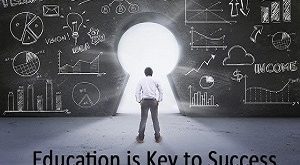Introduction:
Education is often described as the cornerstone of personal and societal development, shaping individuals and communities in profound ways. The impact of education extends beyond the classroom, influencing various aspects of our lives and contributing to the fabric of society. In this article, we will explore the multifaceted impact of education on our lives, covering areas such as personal growth, career opportunities, social mobility, and the cultivation of critical thinking skills.
Personal Growth and Development:
Education serves as a catalyst for personal growth and development, nurturing individuals intellectually, emotionally, and socially. From early childhood education to higher learning, each stage of the educational journey plays a crucial role in shaping character, instilling values, and fostering a sense of identity.
In the early years, education provides a foundation for cognitive and social skills, helping individuals develop essential abilities like communication, problem-solving, and teamwork. As individuals progress through higher levels of education, they are exposed to a diverse range of subjects and ideas, broadening their perspectives and contributing to a more well-rounded understanding of the world.
Moreover, education encourages a lifelong love of learning, instilling curiosity and the pursuit of knowledge. The continuous process of learning, unlearning, and relearning is fundamental to personal growth, enabling individuals to adapt to changing circumstances and remain intellectually engaged throughout their lives.
Career Opportunities and Economic Empowerment:
One of the most tangible impacts of education is its role in providing access to diverse career opportunities and contributing to economic empowerment. Education equips individuals with the knowledge and skills necessary to enter the workforce, pursue specialized fields, and contribute meaningfully to various industries.
Formal education, particularly higher education, often serves as a gateway to professions that require specialized knowledge and expertise. It not only enhances employability but also opens doors to career advancement and leadership roles. The correlation between higher levels of education and higher earning potential is well-documented, underscoring the economic benefits of investing in education.
Furthermore, education fosters a culture of innovation and entrepreneurship. Individuals with a solid educational foundation are better positioned to identify opportunities, think critically, and contribute to the development of new ideas and solutions. This, in turn, has a ripple effect on economic growth and societal progress.
Social Mobility and Equality:
Education has the power to break down barriers and promote social mobility, offering individuals the opportunity to transcend socio-economic constraints. Through education, individuals from diverse backgrounds can acquire the skills needed to improve their economic status and contribute to the overall development of their communities.
Access to quality education is a key factor in addressing societal inequalities. Efforts to ensure equal educational opportunities, regardless of socio-economic background or geographic location, play a crucial role in creating a more just and equitable society. Education becomes a transformative force when it becomes accessible to all, irrespective of gender, race, or economic status.
Moreover, education promotes social cohesion by fostering understanding and empathy. Exposure to diverse perspectives and experiences within an educational setting contributes to a more inclusive society, breaking down stereotypes and promoting a sense of shared humanity.
Cultivation of Critical Thinking Skills:
Education is not merely about acquiring information but also about developing critical thinking skills. The ability to analyze, evaluate, and synthesize information is a fundamental outcome of education, empowering individuals to make informed decisions and navigate the complexities of the modern world.
Critical thinking is a skill that extends beyond academic settings, influencing various aspects of life, including problem-solving, decision-making, and effective communication. Individuals with strong critical thinking skills are better equipped to adapt to change, engage in constructive dialogue, and contribute to the development of innovative solutions to societal challenges.
In an era of information overload, education becomes a tool for distinguishing between reliable information and misinformation. The cultivation of critical thinking skills is essential in fostering a society that values evidence-based reasoning and informed decision-making.
Conclusion:
The impact of education on our lives is immeasurable, touching every aspect of personal growth, career opportunities, social mobility, and the development of critical thinking skills. As we navigate an ever-changing world, the transformative power of education becomes increasingly evident, shaping individuals into informed, empowered, and engaged members of society.
While recognizing the myriad benefits of education, it is essential to address challenges related to access, quality, and inclusivity. Efforts to enhance educational opportunities for all, irrespective of background, contribute not only to individual success but also to the overall progress and well-being of societies around the globe. Education, as a force for positive change, remains a beacon of hope for a brighter and more equitable future.?

